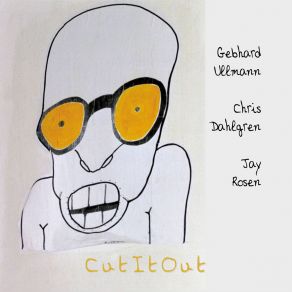Cutitout
Download links and information about Cutitout by Gebhard Ullmann, Jay Rosen, Chris Dahlgren. This album was released in 2006 and it belongs to Jazz, Avant Garde Jazz genres. It contains 10 tracks with total duration of 57:58 minutes.

|
|
|---|---|
| Artist: | Gebhard Ullmann, Jay Rosen, Chris Dahlgren |
| Release date: | 2006 |
| Genre: | Jazz, Avant Garde Jazz |
| Tracks: | 10 |
| Duration: | 57:58 |
| Buy it NOW at: | |
| Buy on iTunes $9.99 | |
Tracks
[Edit]| No. | Title | Length |
|---|---|---|
| 1. | Grid Speak | 4:15 |
| 2. | Calling Mr. Waits No. 1 | 5:52 |
| 3. | U.S.O. Ballad | 5:16 |
| 4. | Lolligager | 3:09 |
| 5. | No Mouthpiece | 7:58 |
| 6. | Calling Mr. Waits No. 2 | 4:39 |
| 7. | Mbira | 4:33 |
| 8. | Walking Under Trains | 4:46 |
| 9. | Bass/Bass | 10:52 |
| 10. | Epilog (Ballad No.2) | 6:38 |
Details
[Edit]There are few avant-jazzers quite as prolific as reedman Gebhard Ullmann, who has released almost 40 albums as a leader and plans to release four more by early 2006 — though you could argue that number of releases counts for less when your focus is on free improvisation. (After all, improv albums require notably less preparation than do composed ones, and, if you're a cynic, you might suspect that there's no such thing as a bad take anyway.) On Cut It Out, Ullmann is teamed up with bassist Chris Dahlgren (who makes various electronic contributions as well) and percussionist Jay Rosen. The session was recorded live to two-track in Dahlgren's living room, and the music stays primarily in the low registers. Ullmann limits himself to bass clarinet and bass flute, and combined with Dahlgren's growling, muttering basslines and Rosen's nervous and jittery percussion, the sound throughout much of the album brings to mind a convention of huge, irritable insects. "Grid Speak" and "Calling Mr. Waits No. 1" are especially dark and ominous, while "U.S.O. Ballad" is more jazzy and features some downright gorgeous flute playing from Ullmann. "No Mouthpiece" offers little of interest beyond the percussion, which sounds suspiciously like a typewriter, but "Calling Mr. Waits No. 2" is intriguing — it has a faintly Middle Eastern flavor, and brings to mind the image of a caravan making slow progress in the desert night. "Mbira" puts percussion and electronics at the center of the sound to nice effect, and "Walking Under Trains" actually flirts with a swing feel during a lovely conversation between the string bass and the bass clarinet, before launching into a resolutely swinging straight-ahead jazz section. Perhaps not essential, but well-worth hearing.